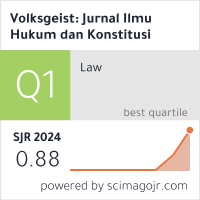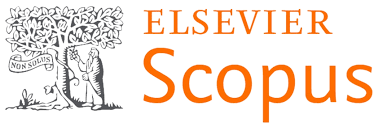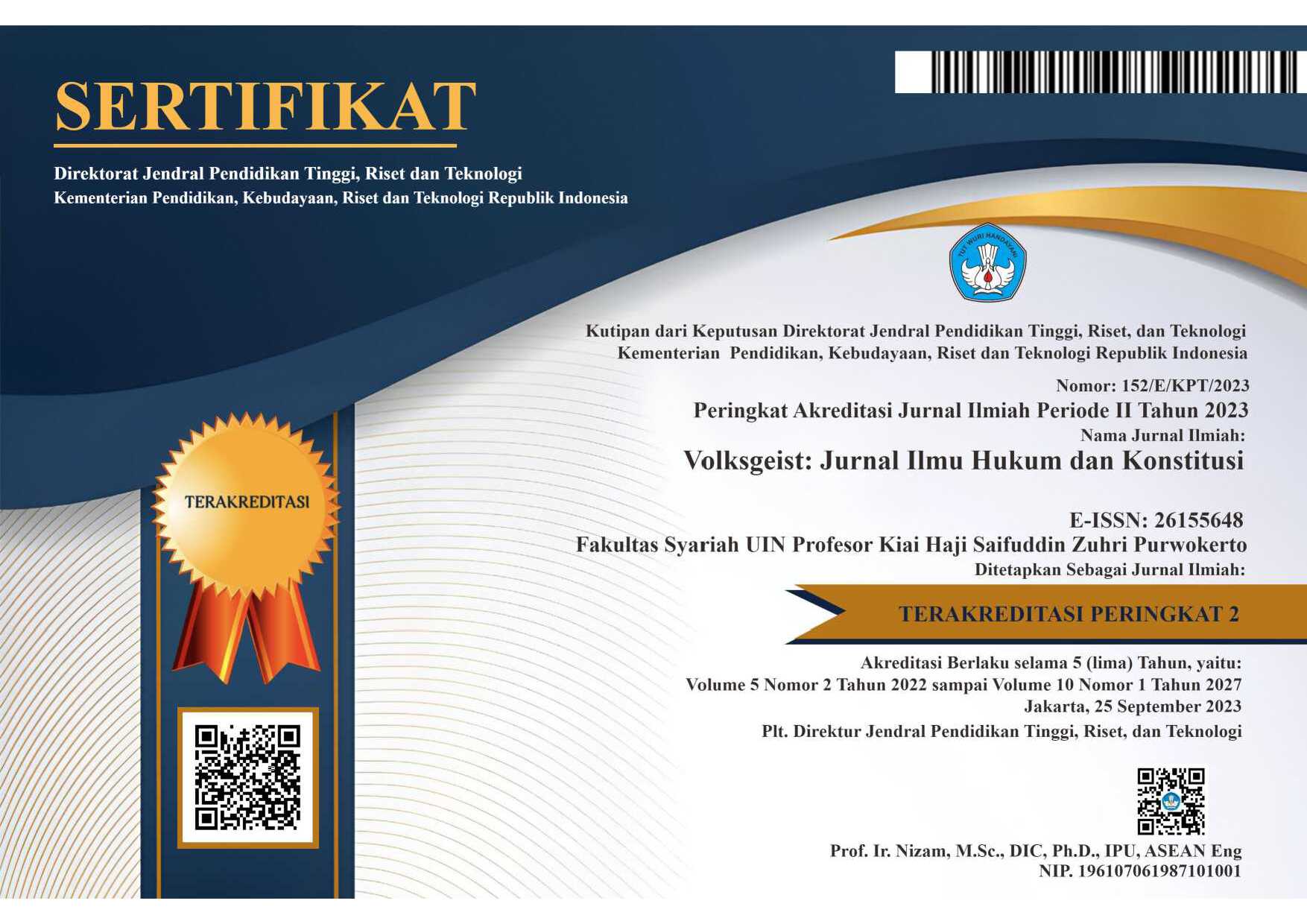Ethno-Political Dynamism and Its Role in the Development of Indonesian Islamic Banking Law
DOI:
https://doi.org/10.24090/volksgeist.v7i2.11077Keywords:
Ethnopolitics; Islamic banking law; Islamic finance.Abstract
Studies on Indonesia's political conditions during the New Order until the 1990s reveal a significant shift in political dynamics, transitioning from a stance largely closed to Islamic interests to one that increasingly accommodated Islam through specific policies. This article aims to determine the influence of the ethnopolitical dynamics of Islam formed by the New Order on the development of Islamic banking law and its impact on the financial sector in Indonesia. Through a historical and contextual literature review, supplemented by interviews, it was observed that ethnopolitical dynamics significantly influenced the evolution of Indonesian banking law during and after that period. The influence of Islamic ethnopolitics, particularly in academic circles, has increasingly emerged as a dynamic force in facilitating the development of Islamic banking in Indonesia, underscoring the numerous challenges encountered in achieving market acceptance. Although its growth has not met market expectations, ethnopolitically, Islam continues to lobby for Islamic banking regulations. Furthermore, since 2019, the role of ethnopolitics has continued to realize policy and regulatory responses aimed at encouraging the growth of Islamic finance in Indonesia.Downloads
References
Ahmad, M B. “Islam and Economic Growth In Malaysia, Thesis (Magister).” Naval Postgraduate School, 2003.
Ali, M. “Islam and Economic Development in New Order’s Indonesia (1967-1998).” East-West Center Paper 12, 2004.
Ananta et al. “A New Classification of Indonesia’s Ethnic Groups (Based on the 2010 Population Census).” ISEAS Working Paper, no. 1 (2014).
Angel, J. R. “The New Emerging Forces in Indonesian Foreign Policy.” In Thesis of Doctor of Philosophy in the Australian National University, February, Vol. II, 1970.
Antonio, M. S. “Interview.” Andalusia Mosque, Tazkia Institute, Bogor: Tazkia Institute, 2018.
Asmarudin, Imam, Mohammad Fauzan, Abdul Aziz Nasihuddin, Riris Ardhanariswari, Hariyanto Hariyanto, and Bhanu Prakash Nunna. “Initiating the Reform of Principle Norms in the Formation of Laws in Indonesia.” Jurnal IUS Kajian Hukum Dan Keadilan 12, no. 2 (August 19, 2024): 208–26. https://doi.org/10.29303/IUS.V12I2.1390.
Asyiqin, Istianah Zainal, M Fabian Akbar, and Manuel Beltrán Genovés. “Cryptocurrency as a Medium of Rupiah Exchange: Perspective Sharia Islamic Law and Jurisprudential Analysis.” Volksgeist: Jurnal Ilmu Hukum Dan Konstitusi 7, no. 2 SE-Articles (November 2024): 227–92. https://doi.org/10.24090/volksgeist.v7i2.10975.
Bourchier, D., and V. R. Hadiz. Indonesian Politics and Society: A Reader. Edited by D Bourchier and V R Hadiz. London: Routledge Curzon, 2003.
Bourchier, D. M. “Two Decades of Ideological Contestation in Indonesia: From Democratic Cosmopolitanism to Religious Nationalism.” Journal of Contemporary Asia 49, no. 5 (2018): 713–733. https://doi.org/https://doi.org/10.1 080/00472336.2019.1590620.
Bruinessen, M. Van. “Indonesian Muslims and Their Place in the Larger World of Islam’ [117-140.” In Indonesia Rising: The Repositioning of Asia’s Third Giant, edited by Anthony Reid. Singapore: ISEAS, 2012.
Buehler, M. “Islam and Democracy in Indonesia.” Insight Turkey 11, no. 4 (2009): 51–63. https://doi.org/https://www.insightturkey.com/file/828/islam-and-democracy-in-indonesia-fall-2009-vol11-no4.
Carnegie, P J. “Political Islam and Democratic Change in Indonesia.” Asian Social Science 4, no. 11 (2009): 1–7. https://doi.org/10.5539/ass.v4n11p3.
Choiruzzada, Shofwan Al Banna, and Bhakti Eko Nugroho. “Indonesia’s Islamic Economy Project and the Islamic Scholars.” Procedia Environmental Sciences 17 (2013): 957 – 966.
Dahlan, Ahmad, Mawardi Mawardi, and Shaifurrokhman Mahfudz. “The Crucial History of Sharia Banking Law Development in Indonesia.” Al-Manahij: Jurnal Kajian Hukum Islam 17, no. 1 (April 6, 2023): 27–40. https://doi.org/10.24090/MNH.V17I1.7191.
Dahlan, Ahmad, Adam Voak, and Naerul Edwin Kiky Aprianto. “The Political Challenge of Islamic Economic Development in The Jokowi Government, Indonesia.” IQTISHODUNA: Jurnal Ekonomi Islam 13, no. 1 (April 1, 2024): 81–100. https://doi.org/10.54471/IQTISHODUNA.V13I1.2386.
Effendy, B. Islam and State in Indonesia. Singapura: Institute of Southeast Asian Studies, 2003.
Fatgehipon, A H. “The Relationship Amongst Soeharto, Military, and Muslim in the End of New Order Regime.” Paramita: Historical Studies Journal 26, no. 1 (2016): 1–8.
Fealy, G, and R Bush. “The Political Decline of Traditional Ulama in Indonesia’.” Asian Journal of Social Science 42 (2014): 536–560. https://doi.org/10.1163/15685314-04205004.
Firmansyah, Yohanes, Michelle Angelika S, Hanna Wijaya, and Yana Sylvana. “Elaboration, Collaboration, And Contribution Of Traditional Law In Indonesian National Legal System.” International Journal of Social Science and Religion (IJSSR), March 2021, 1–21. https://doi.org/10.53639/ijssr.v2i1.37.
Fischer, J. “Islamic Mobility: Car Culture in Modern Malaysia’.” Journal of Consumer Culture 16, no. 2 (2016): 572–591. https://doi.org/10.1177/1469540514531683.
Ganev, I, and V Lazarov. “The Nature and Solution of Ethno-Political Conflicts.” Bulgarian Experience’, International Conference; Knowledge-Based Organization 221, no. 2 (2015): 582–586. https://doi.org/10.1515/kbo-2015-0099.
Geertz, C. The Religion of Java. California: Free Press, 1960.
Gurr, T R. “Peoples against States: Ethnopolitical Conflict and the Changing World System: 1994 Presidential Address’.” International Studies Quarterly 38, no. 3 (1994): 347–377,. https://doi.org/10.2307/2600737.
Hadiz, Vedi R. “Indonesian Political Islam: Capitalist Development and the Legacies of the Cold War.” Journal of Current Southeast Asian Affairs 30, no. 1 (2011): 3–38.
Hamat, Z. “History of Islamic Bank in Indonesia: Issues behind Its Establishment’.” International Journal of Finance and Banking Research 2, no. 5 (2016): 178–184. https://doi.org/10.11648/j.ijfbr.20160205.13.
Hariyanto, Hariyanto. “Risk-Based Business License and Problems Arising After The Job Creation ACT.” Jurnal IUS Kajian Hukum Dan Keadilan 10, no. 2 (August 23, 2022): 354–66. https://doi.org/10.29303/IUS.V10I2.1082.
Hefner, R W. “Public Islam and the Problem of Democratization.” Sociology of Religion 62, no. 4 (2001): 491–514.
Hejazziey, D. “Political Aspects of Shari’a Banking Law in Indonesia’.” Jurnal Indo-Islamika’ 2, no. 1 (2012): 105–124. https://doi.org/10.15408/idi.v2i1.1659.
Heryanto, Ariel. “Identity and Pleasure : The Politics of Indonesian Screen Culture,” 2014, 246.
Hidayatullah, Muhammad Syarif, and Rahmat Fadillah. “Economic and Legal Dimensions of Collateral Existence in Modern Mudhârabah Contracts: Understanding the Relationship between Risk Management, National Law, and Contemporary Fiqh.” Al-Manahij: Jurnal Kajian Hukum Islam, November 2022, 223–38. https://doi.org/10.24090/mnh.v16i2.6860.
Hossain, M Z. “Zakat in Islam: A Powerful Poverty Alleviating Instrument for Islamic Countries’.” International Journal of Economic Development Research and Investment 3, no. 1 (2012): 1–11.
Husen, M. “An Overview of Islamic Finance’.” IMF Working Paper 15, no. 120 (2015): 1–35.
Imtiyaz, A R M, and B Stavis. “Ethno-Political Conflict in Sri Lanka’.” Journal of Third World Studies 25, no. 2 (2008): 135–152. https://doi.org/http://www.jstor.org/stable/45194483.
Jourek, O. Ethno-Political Conflicts in Post-Communist Societies’. Cambridge, Mass: Harvard University, John F. Kennedy School of Government, 1999.
Kitamura, H. “Islamic Finance as an Ethnopolitical Agenda in the 1980s: An Inquiry into the Role of Islamic Finance Pioneers’.” Sojourn Journal of Social Issues in Southeast Asia 36, no. 1 (2021): 98–123. https://doi.org/10.1355/sj36-1d.
———. “Policymakers’ Logic on Islamic Banking: Islamic Banking as an Ethno-Political Tool in Malaysia’.” Journal of Current Southeast Asian Affairs 40, no. 2 (2020): 245–265. https://doi.org/10.1177/1868103420972406.
Kunarti, Siti, Nur Putri Hidayah, Hariyanto Hariyanto, and Muhammad Bahrul Ulum. “The Legal Politics of Outsourcing and Its Implication for the Protection of Workers in Indonesia.” Sriwijaya Law Review 8, no. 1 (January 2024): 1. https://doi.org/10.28946/slrev.Vol8.Iss1.2750.pp1-19.
Liddle, R William. “‘The Islamic Turn in Indonesia: A Political Explanation.’” The Journal of Asian Studies 55, no. 3 (1996): 613–634.
Maula, Bani Syarif. “Post-Islamism and the Rise of Sharia Laws in Contemporary Indonesia: Aspirations of Implementing Islamic Laws in a Democratic Era.” International Journal of Social Science and Religion (IJSSR), June 2023, 163–84. https://doi.org/10.53639/ijssr.v4i2.137.
Maulana, Diky Faqih, Makhrus Makhrus, and Hamidatul Hasanah. “The Urgency of MUI Halal Fatwa about Food, Beverage, Medicine and Cosmetic Products for the Consumer Protection.” Volksgeist: Jurnal Ilmu Hukum & Konstitusi 5, no. 2 (2022). https://doi.org/https://doi.org/10.24090/volksgeist.v5i2.6421.
Metwally, M M. “Economic Consequences of Applying Islamic Principles in Muslim Societies’.” International Journal of Social Economics 24, no. 7/8/9 (2017): 941–957.
Morfit, M. “The Indonesian State Ideology According to the New Order Government’.” Asian Survey 21, no. 8 (1981): 838–851. https://doi.org/10.2307/2643886.
Mujani, S, and W R Liddle. “Politics, Islam, and Public Opinion’.” Journal of Democracy 15, no. 1 (2004): 109–123. https://doi.org/10.1353/jod.2004.0006.
Perwaatmadja, K A. “Interview.” Tuesday, 2017.
Prayudi. “Analysing The Role Of Islam Within Indonesia’s Culture And Politic.” Ponte 73, no. 4 (2017): 120–132.
Rahmawati, A. “Papuan Ethnopolitical Conflict: Causes, Contexts, and Policy Implications’.” California, USA, 2004.
Rashid, and Shaheed F. “Pakistan: Ethno-Politics and Contending Elites, United Nations Research Institute for Social Development (UNRISD)’.” Discussion Paper, no. 45, June (1993): 1–35.
Rinakit, S. “The Indonesian Military after the New Order.” In Southeast Asian Studies (ISEAS) and Nordic Institute of Asian Studies (NIAS. Copenhagen Denmark: Singapore, 2005.
Rudnyckyj, D. “Technologies of Servitude: Governmentality and Indonesian Transnational Labor Migration’.” Anthropological Quarterly 77, no. 3 (2004): 407–434. https://doi.org/10.1353/anq.2004.0045.
Rudolph, J R. “The Significance of Ethno-Politics in Modern States and Society’.” In The Palgrave Handbook of Ethnicity, edited by S Ratuva and ed), 149–167. Springer Nature Singapore Pte Ltd, 2019.
Saleh, A S, and R Zeitun. Islamic Banking Performance in the Middle East: A Case Study of Jordan’. Economics Working Paper Series, WP 06-21. Department of Economics, University of Wollongong, 2006.
Schoon, N. “Islamic Finance – an Overview’.” European Business Organization Law Review 9 (2008): 621–636. https://doi.org/10.1017/S1566752908006216.
Seibel, H D, and O Imady. “Principles and Products of Islamic Finance’.” Working Paper, no. 1 (2006).
Siraj, F M. “Anti-Democracy Policy of the Indonesian ‘New Order’ Government on Islam in 1966-1987’.” Jurnal Al-Tamaddun 14, no. 2 (2019): 75–87. https://doi.org/10.22452/JAT.vol14no2.7.
Sofhian. “The Rationality Prohibition of Riba (Usury)’.” Al-Ulum 15, no. 1 (2015): 237–266. https://doi.org/10.30603/au.v15i1.224.
Suleymanova, S, and J Dzhanteeva. “Essential Characteristics of Ethnopolitical Communications’.” SHS Web of Conferences 94, no. 3018 (2021): 1–6. https://doi.org/10.1051/shsconf/20219403018.
Sulistyandari, Sulistyandari, Ulil Afwa, Putri Ayu Sutrisno, and Rohaida Nordin. “Implementation of Prudential Banking Principles: State Responsibility in Combating Banking Crimes in Indonesia.” Volksgeist: Jurnal Ilmu Hukum Dan Konstitusi, November 2024, 341–59. https://doi.org/10.24090/volksgeist.v7i2.12132.
Tabash, M I, and R S Dhankar. “The Flow of Islamic Finance and Economic Growth: An Empirical Evidence of Middle East’.” Journal of Finance and Accounting 2, no. 1 (2014): 11–19. https://doi.org/10.11648/j.jfa.20140201.12.
Team, Thomson Reuters. “State of The Global Islamic Economy Report 2016/17, Thomson Reuters in Collaboration with DinarStandard and Supported by Dubai The Capital of Islamic Economy,” 2015.
The World Bank. “Islamic Finance,” 2015.
Umam, A K, and A A Junaedi. “Political Islam: The Shrinking Trend and the Future Trajectory of Islamic Political Parties in Indonesia’.” Masyarakat, Kebudayaan Dan Politik 30, no. 1 (2017): 1–12. https://doi.org/10.20473/mkp.V30I12017.1-12.
Warde, Ibrahim. Islamic Finance in The Global Economy. Edinburgh, U.K: Edinburgh University Press, 2010.
White, P S. “Working in the Islamic Economy: Sharia-Ization and the Malaysian Workplace’.” Sojourn: Journal of Social Issues in Southeast Asia 26, no. 2 (2011): 304–335. https://doi.org/10.1355/sj26-2g.
Yahaya, H. “Tabung Haji Malaysia as a World Role Model of Islamic Management Institutions’.” International Journal of Business and Management Invention 5, no. 11 (2016): 44–55.
Yunanto, S, and A F A Hamid. “Fragmentation and Conflict among Islamic Political Parties in Indonesia during Reformasi Era (1998-2009), Anatomy, Factors and Implications’.” Journal of Indonesian Islam 7, no. 2 (2013): 337–365. https://doi.org/10.15642/JIIS.2013.7.2.337-365.
Zarkasyi, H M. “The Rise of Islamic Religious-Political Movements in Indonesia the Background, Present Situation and Future’.” Journal of Indonesian Islam 2, no. 2 (2008): 368–378.
Downloads
Published
How to Cite
Issue
Section
License
Copyright (c) 2024 Ahmad Dahlan, Adam Voak, James Chin, Edward Mariyani-Squire, Naerul Edwin Kiky Aprianto

This work is licensed under a Creative Commons Attribution-ShareAlike 4.0 International License.
Copyright Notice
Authors who publish with this journal agree to the following terms: Authors retain copyright and grant the journal right of first publication with the work simultaneously licensed under a Creative Commons Attribution-ShareAlike 4.0 International License that allows others to share the work with an acknowledgment of the work's authorship and initial publication in this journal.











